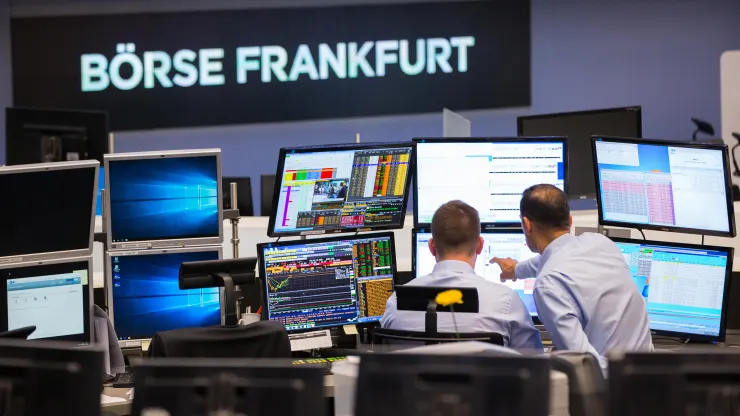European markets ended the day on a high note, with the German DAX index reaching a record level. This surge was driven by the easing of inflation in Germany, a development that has boosted investor confidence across the continent. As one of the Eurozone’s largest economies, Germany’s economic health is a significant indicator for the rest of Europe, making today’s developments particularly noteworthy.

DAX Index Soars to New Heights
Germany’s DAX index, a key benchmark for the country’s 40 largest publicly traded companies, saw an impressive uptick, closing at a record high. This surge was fueled by fresh data showing that inflation in Germany has started to ease, a welcome sign for businesses and consumers alike. Lower inflation typically translates to better purchasing power and reduced costs for companies, which can boost corporate earnings and, in turn, stock prices.
Investors have been closely watching Germany’s inflation figures, as the country’s economic performance often sets the tone for the broader European market. With inflation showing signs of cooling, market sentiment has turned more optimistic, leading to increased buying activity in German stocks.
Easing Inflation Brings Relief to Investors
The latest data from Germany indicated that inflation is beginning to ease, offering relief to a market that has been grappling with rising costs for months. Inflation has been a significant concern across Europe, with central banks raising interest rates in an attempt to control soaring prices. However, the recent figures suggest that these measures might be starting to take effect, potentially easing the pressure on the European Central Bank (ECB) to implement further rate hikes.
The ECB has been in a delicate balancing act, trying to curb inflation without stifling economic growth. The latest inflation data from Germany provides some breathing room, allowing the central bank to potentially adopt a more measured approach in its monetary policy decisions. This has been positively received by investors, who are hopeful that the worst of the inflationary pressures might be over.
Broader European Markets Follow Suit
Germany’s positive economic data had a ripple effect across other European markets, with major indices closing higher. The French CAC 40 and the UK’s FTSE 100 both posted gains, buoyed by the optimism stemming from Germany’s inflation report. The pan-European Stoxx 600 index also experienced an uplift, reflecting broad-based gains across various sectors.
Sectors that have been particularly sensitive to inflation, such as consumer goods and manufacturing, saw strong performances today. As inflationary pressures ease, companies in these sectors are likely to benefit from lower input costs, which can improve profit margins and drive stock prices higher.
Analysts Weigh In on Future Prospects
Market analysts are cautiously optimistic about the future prospects of European markets. The easing of inflation in Germany is a positive development, but challenges remain, particularly in the form of geopolitical tensions and the potential for further economic slowdowns. However, if inflation continues to trend downwards and the ECB can avoid aggressive rate hikes, European markets could see sustained growth in the coming months.
“The key takeaway from today’s market action is that investor sentiment is improving as inflation fears subside,” said a leading market strategist. “However, it’s important to remain vigilant, as there are still several factors that could impact market performance in the near term.”
Currency Markets and Bond Yields React
The Euro showed modest gains against the US dollar following the release of the German inflation data. A stronger Euro typically reflects investor confidence in the European economy. Bond yields across Europe were mixed, with some countries seeing slight increases as investors weighed the potential for future ECB rate decisions.
Conclusion: A Positive Day for European Markets
Today’s market performance underscores the importance of Germany’s economic health to the broader European market. As inflation shows signs of easing, investors are growing more confident in the region’s economic prospects. However, with ongoing global uncertainties, market participants will continue to keep a close eye on inflation trends and central bank actions.
For more insights and updates on global markets, stay tuned to Digital Digest.




